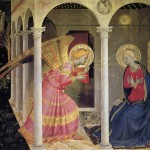I’m pleased to announce that Pascal-Emmanuel Gobry has joined the Catholic team here at Patheos with his new blog “Inebriate Me.” He explains, in his first post, why he named his blog after a line from the Anima Christi:
I chose this line, specifically, because it’s perhaps the effect of Christ’s grace that’s most overlooked, and perhaps most important: Christ, make me drunk on your grace.
To get drunk is to get happy. It’s also to get a little reckless. It’s also to be–and it’s not good with earthly wine, but with spiritual wine…–addicted. Blood of Christ, inebriate me! I want to get drunk on God’s grace.
And the image I used for the logo of the blog is from Salvador Dali’s Christ of Saint John of the Cross, which might be my favorite Crucifixion painting. This is what I want to get drunk on. A Cross that transcends space and time and opens up new vistas.
I’m delighted. PEG (as he’s known on twitter) has written for First Things, Commentary, The Atlantic, Quartz, The Week, and more. And I may or may not have done an excited dance the first few times he retweeted posts of mine. I like his writing a lot, and, the great bonus of having him on Patheos (besides bragging rights) is that I expect this means that he’ll be doing more religion writing as a result. So, get thee to your RSS readers, and, in the meantime, check out some of his pre-Patheos pieces. I’ve highlighted one:
This is the central paradox of Christianity. The Bible portrays God as impossibly transcendent, “that which nothing greater can be thought” (Anselm). He is the Most High Lord. He is Yahweh—He is Being Itself.
We see this right away in Genesis. God puts up the Sun and the Moon as lights in the sky. Genesis was written against the backdrop of Babylonian religion, to which the Sun and the Moon were the supreme gods. The God of the Jews is so transcendent that He’s not just superior to the Babylonian gods—they are like props to Him. This was the central, radical, world-changing innovation of monotheism—that God is not just one, but (and therefore) unfathomably transcendent.
And yet this same Genesis story which is all about God’s transcendence describes God as dwelling in the Garden of Eden, as not only “hanging out” with His creatures but wanting to.
God’s longing to dwell with His people is what the Covenant is all about. We think of the Covenant as a matter of law, and of course it is, but it is about dwelling. God dwells as the burning bush and as the pillar of smoke. He dwells in the Ark of the Covenant and the Holy of Holies.
Every word in that phrase matters. God longs to dwell with His people. The Song of Songs, which all scriptural authorities I’m aware of interpret as a metaphor of God’s love for man, attests to this. God’s desire to dwell with His people does not make sense outside of a longing, of a gratuitous, powerful desire to be with us. God’s will is not cold or calculating in human terms. God longs to be with us. The Psalms make it clear. You knit me in my mother’s womb, etc.
And this being with us, this Emmanuel quality, is a dwelling. To dwell is an important concept in the desert religion of the Israelites. To dwell is to be home. It is to be at rest, at peace. God longs to dwell with us. Hence the Temple, hence the Holy of Holies. The recurring metaphor of God’s Kingdom as a household also accentuates this, and points to another recurring metaphor of God’s relationship to man as nuptial. Again, God’s desire for us to worship Him and be righteous under the Law, very real, do not account for all of the mystery of His interactions with His people. There is also, foremost, His longing to dwell with His people. It is a longing for dwelling because it is love. God longs to dwell with us for the same reason lovers long to dwell together—just because they love each other. God’s law and God’s justice find their place in the mechanics of an economy of salvation, but God’s longing to dwell is a gratuitous expression of love.
And it is with His people that God desires to dwell. On the Cross (and I will get there, I think you’ve figured that by now) there is a radical individualism, one that frees us from human community structures, one that breaks away all human bonds that separate us from a personal relationship with Jesus Christ, and we cannot discount this. But there is undoubtedly an extent to which we in the individualistic, modern West have lost track of the extent to which God’s desire for union with us is collective as well as individual. God is the God of the Covenant, he is the God who makes a people after him. Joseph Ratzinger writes nicely about how creed is different from philosophy and implies Church—the philosophy comes from the individual and rises up towards the universal, but at the end of the day its source is always the individual. Whereas a creed creates a community—if I believe what you believe, we are in fellowship. A creed implies a one-to-many relationship between God and a people. So does a covenant.
And—finally I get to it—this longing of God to dwell with His people finds its climax, its most complete expression, in the Incarnation. Here the dwelling is total. God no longer dwells in the world, He dwells in our very nature. The Word became flesh and dwelt among us. This dwelling is in the full continuity of the Old Covenant: Mary is hailed as “full of grace”, an expression referring to the Holy of Holies. Mary is the new Ark of the New Covenant.
The Incarnation of our Lord Jesus Christ is the most powerful testimony to the strength and enduring power of God’s longing to dwell with His people. For God so loved the world that He gave His only Son. But of course His only Son is God. God’s longing to dwell with us is absolute. It does not end, and it is gratuitous, it is overpowering. God longs to dwell with His people not (or not only) because it is “necessary for salvation” as if He were fulfilling some heavenly checklist (that He would be bound by). God longs to dwell with His people because He is love and He loves us, and lovers want to be together because they are lovers, and that is enough.












